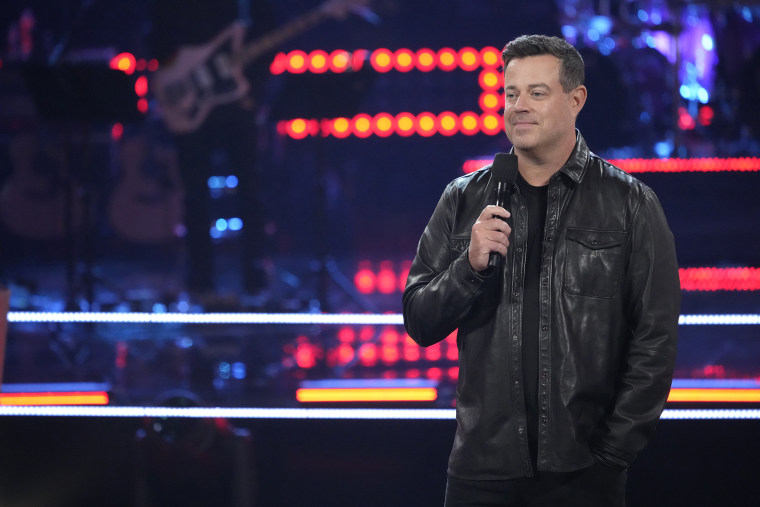More than four years after opening up about his struggle with panic attacks, Carson Daly is giving new insight into what his life is truly like when he faces the cameras as part of his work.
The TODAY co-host also has a prominent role on NBC's singing competition, “The Voice,” where he’s not always as calm as he seems. (Both programs are part of NBCUniversal.)
For example, when Carson’s hosting “The Voice,” he’s always smiling and camera-ready, but in reality, he’s still struggling with anxiety.
"Oh God, I felt like I was going to die," he recalled of having a panic attack on "The Voice" during an Oct. 10 appearance for World Mental Health Day 2023 and his Mind Matters series, which seeks to destigmatize mental illness.
"It felt like really intense fight or flight, like you have to run off the stage. You feel like you’re going pass out. You feel like your equilibrium’s off, your heart’s racing. Basically like there’s an imminent threat in your life, but there isn’t. And so you just have to hold on because it usually passes in about 30 seconds."
Carson previously opened up in an Instagram Live about a particular moment where he had to put his right hand in his pocket to help cope with his anxiety, and it was captured in a photo.
“You think my right hand’s in my pocket just being casual. ‘I’m on TV and my life is so great,’” he said. “The truth is, in that moment, I was gripping the flash of my upper right thigh because a wave of panic was coming through me, and I was so scared. I wanted to run off the stage because it’s one of the symptoms of panic. I can’t control my nervous system. Fight or flight kicks in. The threat is real, but there’s nothing there. I have to just ride that wave on live TV.”

"I got through it and I'm OK. It's part of how I manage my life," he added. "You think you know, but you don't know what someone's going through. ... I love breaking the idea that people think they know me, and they think that my life is just so perfect and he has all the assets.”
Carson previously opened up about the same experience to USA Today.
“You may think my life’s perfect. I’ve got kids. I always look happy on TV. ... But that’s just not how it works,” he said. “Things are not what they seem, and people need to know that’s OK."
Carson revealed in 2018 that he has generalized anxiety disorder (GAD), which means he is gripped by excessive feelings of fear and worry. His first panic attack struck when he hosted MTV's “Total Request Live.”
Even before that, he described himself as a "worrywart kid" who had an ulcer when he was in high school. Panic attacks have sometimes gripped him during relaxed moments, like at the playground with his children.
The 50-year-old said he’s in a “much better place” and “on a really good personal path” since going public with his diagnosis.
“Once you realize that other people have (GAD) — that it’s an actual diagnosable thing, and there is a whole psychology and physiology behind it — you have context, and I think learning about all that, talking about it, exploring it has just ripped the veil,” he told USA Today.
“I shared my story haphazardly one day, and now this mental health area has become kind of my place at NBC News and within the show and the creation of Mind Matters to find other stories of people like me, whether they’re famous or not.”
Carson called those stories inspiring, noting he’s had a chance to talk with Americans who face different struggles from his, such as suicidal ideation or depression. “I’m in such awe of the bravery of people,” he noted.
The goals of the series include giving a voice to Americans whose mental health problems may be ignored or unrecognized.
“I try to do a lot of shining a light on communities of color, because access to mental health care (in these communities) is just awful. And there’s already a stigma that’s worse than it is for white counterparts,” Carson said.
“I think by and large, the conversations are happening a lot more frequently. You hear mental health certainly in music and pop culture and from celebrities that are up and coming … and are willing to talk about it. So I definitely think we’re headed in the right direction.”
